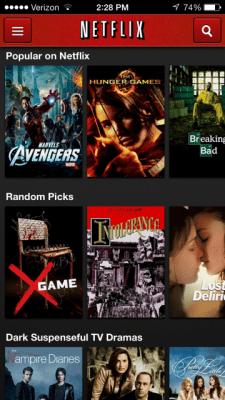Today, Netflix posted its third-quarter earnings, with the streaming video provider exceeding analyst projections thanks to strong subscriber growth in which it added 1.3 million domestically. Netflix CEO Reed Hastings and CFO David Wells said in a letter to shareholders this afternoon that the company recently surpassed the 40 million members milestone, up from “less than 30 million just one year ago,” they said.
That’s not the only milestone Netflix checked off in the third quarter. In an earnings interview this afternoon, Hastings said that the company served up over 5 billion hours of streaming video content over the last three months. Netflix leadership last shared streaming numbers in April, when the CEO announced via Facebook that members had watched more than four billion hours of video during the first quarter of 2013.
So that means that viewership increased by 1 billion hours over the last six months, for a total of 9 billion hours streamed over the course of the two quarters (Netflix has not shared viewership numbers from Q2).
What’s behind this eager consumption of Netflix streaming content? First and foremost, Netflix is continuing full-steam ahead with the production of high-quality original content, launching House of Cards earlier this year, which it followed up with its teen thriller Hemlock Grove, the much-anticipated third season of Arrested Development and now Weeds creator Jenji Kohan’s new dramedy set in a women’s prison, Orange Is The New Black.
For Netflix, what’s likely just as important as the number of viewers these shows have been able to bring in is that it’s now able to say that, like HBO, its now producing original content that’s worthy of bringing home hardware. At this year’s Emmy Awards, Netflix became the first company of its kind to win multiple awards, as House of Cards Director David Fincher took home “Best Director,” while the show also captured awards for Casting and Cinematography.
Netflix is on a mission to compete with HBO, which has long set the standard for excellence in original content, taking home 27 Emmy Awards this year — to Netflix’s three. While it still has a long way to go in the award department, Netflix has reportedly surpassed HBO in another key area: Paid domestic subscribers. According to Netflix’s earnings report today, the company now has 29.9 million paying members, whereas SNL Kagan (via Bloomberg) reports that HBO has 28.7 million U.S. customers.
Hold onto your hats, original programming lovers, that puts Netflix in the lead for the first time. Of course, just as it is on the hardware front, Netflix still has a very long way to go when it comes to the total number of paying customers worldwide. In Q3, Netflix came in at about 38 million total paid subscribers for both the U.S. and foreign markets, whereas HBO boasts about 114 million subscribers. Netflix is making solid progress for a digital and DVD streaming rental service when compared to the wily old veteran of premium cable and satellite network television.
Yes, Netflix has a long road ahead of it, and any sign of weakness usually sends shareholders into a tizzy. However, the company’s stock is holding strong, up 6 percent in after-hours trading and up over 200 percent over the last year. But if Netflix continues to see strong domestic and international subscriber growth, keeps pumping out quality original content and securing those exclusive deals to stream popular TV shows, then the road between it and HBO may not look so gargantuan after all.
Especially if this remains true:
“We have a remarkable complete rate, which is a good leading indicator with us,” said Chief Content Officer Ted Sarandos in the investor call this afternoon. “On traditional TV, typically the bail-out rate begins to pick up around the third or fourth episode of a show, but what we see is steady growth as people binge out of the gate, and then others catch up later,” he said.
“Compared to shows that lose audience week over week over week, we generally gain audience over time.” It sounds too good to be true, although admittedly David Fincher and Kevin Spacey is a pretty dynamic combination.
